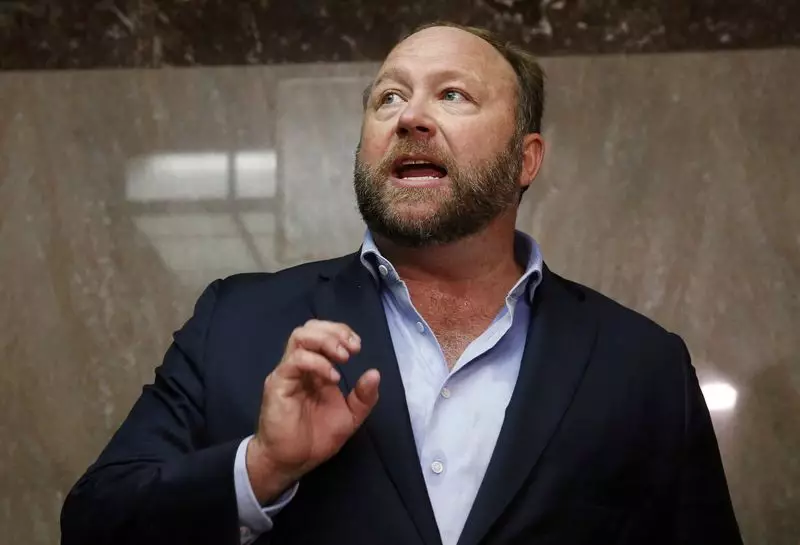The recent developments surrounding the auction of Alex Jones’ Infowars website expose the intricacies and potential pitfalls of bankruptcy proceedings. In a noteworthy judgment delivered by U.S. Bankruptcy Judge Christopher Lopez, the sale of Infowars to the satirical news organization, The Onion, was challenged and ultimately halted. This case, entangled in legal disputes and accusations of collusion, highlights not just the complicated nature of the auction process in bankruptcy cases but also the broader implications for those involved, particularly the stakeholders affected by Jones’ defamation-related debts.
Judge Lopez’s ruling signals a significant misstep in the bankruptcy auction, asserting that it did not yield the best possible financial outcome for Jones’ creditors. He pointed out the haste that marred the process, wherein the court-appointed trustee solicited final offers prematurely without allowing for a more extensive bidding dialogue between The Onion and First American United Companies. This rushed approach betrayed a foundational error in auction strategy, as Judge Lopez remarked, “This should have been opened back up, and it should have been opened back up for everybody.” The implication is clear; an auction that fails to explore the full range of competitive bidding can shortchange creditors and leave significant capital unclaimed.
At stake was the fate of Jones’ media empire, which crumbled under the weight of staggering legal judgments exceeding $1.3 billion. This financial collapse stemmed from repeated acts of defamation against families whose lives were irrevocably altered by the Sandy Hook tragedy, as Jones posited that the event was a hoax designed to promote gun control. The traumatic impact of these assertions, alongside the legal and financial consequences for Jones, paints a chilling picture of the intersection between media influence and personal responsibility.
The Players: Stakeholders and Legal Maneuvering
The parties involved in this debacle include not just the bankrupt media mogul and the competing bidders but also the families of the Sandy Hook victims. They emerged as a significant force in this setting, being the primary creditors in Jones’ bankruptcy case. Their backing of The Onion’s bid—by accepting a debt reduction that would allow other creditors to recover more—crafted a narrative of resilience in the face of adversity. Attorney Chris Mattei, representing these families, emphasized their determination to hold Jones accountable, irrespective of auction outcomes.
Critically, however, the role of the bankruptcy trustee, Christopher Murray, comes under scrutiny. Murray’s assertion of a fair auction raises questions about the mechanisms in place for oversight and transparency during bankruptcy proceedings. As the arbitration of significant assets at stake unfolds, the potential for conflicts of interest and procedural shortcomings poses inherent risks to fulfilling statutory obligations towards creditors and ensuring the distribution of fair monetary value.
The Onion’s aspirations to transform Infowars into a healthier, parody-focused platform were also notable. CEO Ben Collins expressed disappointment over the ruling yet reiterated the organization’s commitment to “a better, funnier internet.” This aspiration is emblematic of the broader cultural dialogue surrounding media ethics, misinformation, and the responsibilities inherent in content creation. If the sale had proceeded, The Onion’s endeavor could have marked a poignant shift away from the cacophony of disinformation that characterized Infowars.
Such aspirations, however, are now on hold as the court necessitates a reset in the auction process. The ruling necessitates delicate navigation of delicate reputational waters, not just for the stakeholders but for the broader media landscape as it grapples with its role in disseminating information.
The stalling of the Infowars auction serves as both a cautionary tale and a learning opportunity. It highlights how transactional failures in financially distressed environments can severely affect stakeholders, particularly those who are victims of personal and societal tragedies. Furthermore, the contentious interplay between creditor rights and debtor responsibilities commands attention in legal forums, revealing a pressing need for refinement in the bankruptcy process.
The outcome of this case will resonate beyond the courtroom—shaping future interactions between media entities and the justice system, while underscoring the need for vigilance against the potential for misinformation to flourish unabated. In navigating this complexity, all participants must remain committed to transparency and equity in the bid to restore—if not to reinstate—the integrity of media platforms.

